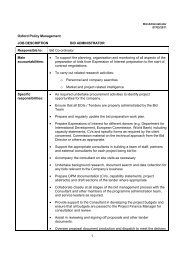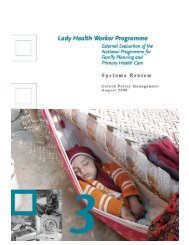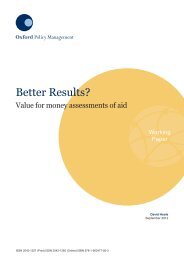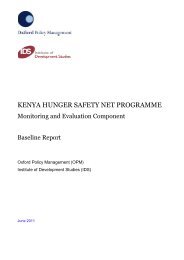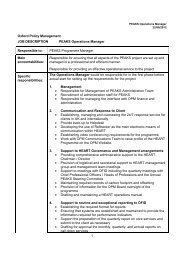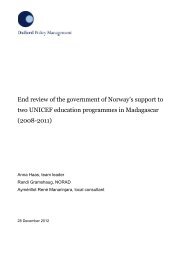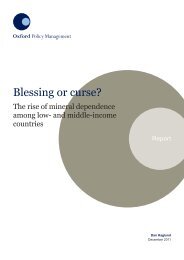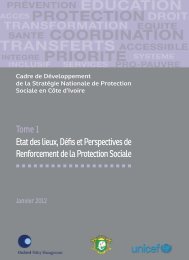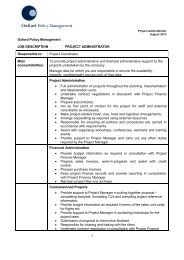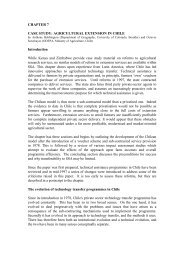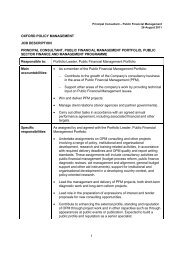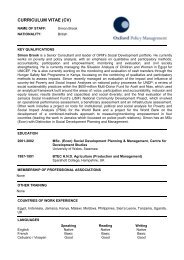LHW Punjab and ICT Report - Oxford Policy Management
LHW Punjab and ICT Report - Oxford Policy Management
LHW Punjab and ICT Report - Oxford Policy Management
Create successful ePaper yourself
Turn your PDF publications into a flip-book with our unique Google optimized e-Paper software.
compared to twenty-five percent in each category nation-wide. The Programme needs towork with the Poor Performers to substantially increase their level of service delivery.Thirteen percent of <strong>LHW</strong>s in <strong>Punjab</strong> <strong>and</strong> <strong>ICT</strong> have additional paid work. This doesnot however cause poor performance as we have found that High Performers are more likelyto have a second job than Poor Performers.The Knowledge TestThe Evaluation Team developed a Knowledge Test based on the <strong>LHW</strong> manual. <strong>LHW</strong>s whowere High Performers in service provision tended to get better test results. In addition, wefound that the higher the education of the <strong>LHW</strong> <strong>and</strong> the Lady Health Supervisor (LHS), thehigher the score. This means that it is important the Programme does not lower its educationcriteria if it wants to maintain performance.Across the country, the knowledge of the <strong>LHW</strong> <strong>and</strong> their Supervisors is high in manyareas. LHSs in AJK <strong>and</strong> FANA score the highest in the country on the Knowledge Test withan average score of seventy-seven percent. On average <strong>LHW</strong>s in <strong>Punjab</strong> <strong>and</strong> <strong>ICT</strong> scoreseventy-percent compared the national average of sixty-nine percent.The low scores <strong>and</strong> lack of in-depth knowledge of a minority of <strong>LHW</strong>s could haveserious clinical consequences as well as undermining the professional reputation of theProgramme. The Programme needs to ensure an on-going system of knowledge assessment<strong>and</strong> reinforcement for all <strong>LHW</strong>s.Organisational Support- Supervision, Pay <strong>and</strong> SuppliesOn average, Supervisors in <strong>Punjab</strong> <strong>and</strong> <strong>ICT</strong> manage twenty-eight <strong>LHW</strong>s. Five percent of<strong>LHW</strong>s in <strong>Punjab</strong> <strong>and</strong> <strong>ICT</strong> do not currently have a Supervisor. The majority of <strong>LHW</strong>s in<strong>Punjab</strong> <strong>and</strong> <strong>ICT</strong> had received at least one visit from their supervisor in the past month <strong>and</strong>had attended a monthly meeting at the health facility in the past two months. On average, inthe previous month Supervisors in <strong>Punjab</strong> <strong>and</strong> <strong>ICT</strong> had worked twenty-three days. Howeverinsufficient access to vehicles <strong>and</strong> lack of sufficient POL allowance is hindering fieldsupervision. Only sixty-seven percent of LHSs in <strong>Punjab</strong> <strong>and</strong> <strong>ICT</strong> reported having full-timeor partial access to a <strong>LHW</strong>P vehicle in the month preceding the survey. LHSs who did nothave vehicles did use public transport but this is not a perfect substitute for vehicle access.Lady Health Workers <strong>and</strong> their supervisors should receive their pay monthly. In<strong>Punjab</strong> <strong>and</strong> <strong>ICT</strong> only thirty-five percent of <strong>LHW</strong>s had received their pay in the past twomonths <strong>and</strong> forty-two percent had not been paid in over three months. The results are similarfor Supervisors. The pay system at the time of the survey was not working well.Medical supplies <strong>and</strong> equipment are essential in ensuring an effective communityhealth service. Also the credibility of an <strong>LHW</strong> amongst her community will also beundermined if she is unable to distribute contraceptives <strong>and</strong> other medicines as expected.Numerous medicines had not been available for the <strong>Punjab</strong>i <strong>and</strong> <strong>ICT</strong> Lady Health Worker’smedicine kit during the previous three months. Supplies are not arriving at the healthfacilities for distribution. This problem has a number of causes including distribution fromProvincial stores <strong>and</strong> insufficient supplies being purchased by the FPIU. In <strong>Punjab</strong> <strong>and</strong> <strong>ICT</strong>,nine percent of the Lady Health Workers did not have a <strong>LHW</strong> manual, which is an importantviii



